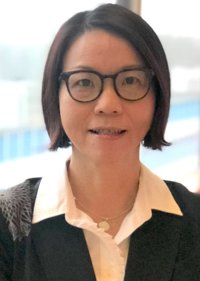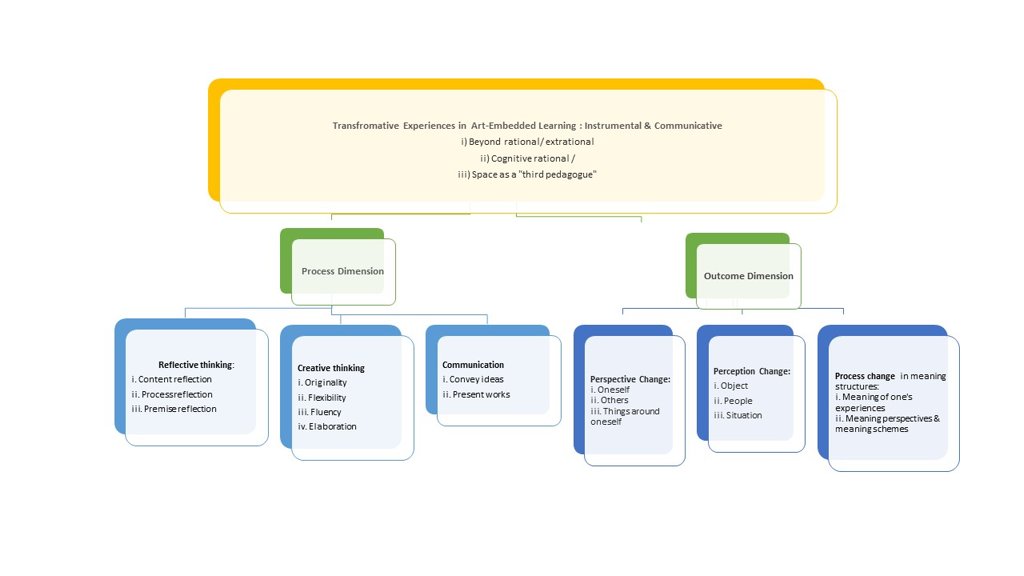The Awareness and Culture track in the Honours programme for Bachelor students (contained within the TU Delft Study Climate programme) leverages new art-embedded learning strategies at the interface of science, technology and society to expose students to the impact of new technologies on society and developing awareness of oneself, others and acquiring new and non-trivial skills. However, a (radical) transformation of one’s mind set, world views, deeply entrenched ways of doing things and belief systems do not occur by default and/ or by going through some regular learning activities. Hence, the Awareness and Culture track sought to facilitate transformative learning through art-embedded learning courses where learners will become more critically reflective of belief systems, social and/or cultural values and they will be able to re-define and/ or reframe a problem/ issue through transformative learning. Esther Tan, senior researcher at the Centre for Education and Learning of Leiden Delft Erasmus conducted a transformative learning project in which art was integrated in engineering education.
Transformative Learning Domains, Processes and Outcomes
 Tan investigated the processes and outcomes of transformative learning in three art-embedded learning courses, namely, ‘Art, Empathy and Ethics’, ‘The world’s a Stage’, and ‘The Laboratory of Science Fiction’. “For the domains of transformative learning, I was interested to investigate beyond rational/ extrarational, cognitive rational and space as a third pedagogue and for processes and outcomes, I examined how reflective thinking, creative thinking and communication could effect a change in perspective, perception and meaning structures’, says Tan. The theoretical assumptions and constructs of transformative learning experiences, processes and outcomes are encapsulated in Fig. 1.
Tan investigated the processes and outcomes of transformative learning in three art-embedded learning courses, namely, ‘Art, Empathy and Ethics’, ‘The world’s a Stage’, and ‘The Laboratory of Science Fiction’. “For the domains of transformative learning, I was interested to investigate beyond rational/ extrarational, cognitive rational and space as a third pedagogue and for processes and outcomes, I examined how reflective thinking, creative thinking and communication could effect a change in perspective, perception and meaning structures’, says Tan. The theoretical assumptions and constructs of transformative learning experiences, processes and outcomes are encapsulated in Fig. 1.
 Fig.1. A Framework for investigating transformative learning experiences, the transformative processes and outcomes in art-embedded learning courses
Fig.1. A Framework for investigating transformative learning experiences, the transformative processes and outcomes in art-embedded learning courses
Three semi-structured interviews for the three art-embedded learning courses were conducted to collect individual narratives of their experiences in transformative learning. Eleven honours students participated in this empirical study: four males and seven females: age ranging from 19 to 22 years old. Three of the students came from the Faculty of Architecture and the Built Environment, two from Applied Sciences, two from the Industrial Design Engineering, two from Electrical Engineering and Computer Science, one from the Aerospace Engineering and one from Civil Engineering. A total of approximately 11 hours of audio footage which amounted to 32 documents of interview responses for analysis.
Findings from Students’ Narratives
‘Three critical findings can be gleaned from the corpus of data and analysis’, explains Tan. ‘Firstly, both “beyond rational/ extrarational and cognitive rational” learning activities do have substantial impact on students’ transformative processes and outcomes regardless of the ‘weird’ art assignments or the deep Socratic discussions. Recurring words and phrases such as “weird artwork, weird performances, absurd, weird assignments, doing some things you’ve never done before ..” could be traced in the narratives and how these seemingly ‘weird’ assignments caused them to become more flexible in solutioning: more originality in conceptualisation and design process,s’ continues Tan. One student recounted, “… Programming is something I am used to in my regular studies so it was nice to see it back here, if you can use programming in a creative way...”. Students experienced more than a perception and/or perspective change in their lives, they experienced a process change in meaning structures as they started to question their existing frames of reference pertaining to personal life and problem-solving approach in project undertakings.
Secondly, the transformational change (perception, perspective or change in meaning structures) that occurs, lies not so much on the acquisition of new information and knowledge, but rather, on a strategic and intentional instructional approach in framing the processing of these new information and new knowledge. Tan: ‘This is evident in many of the responses in the interview narratives that the excellent art instructors were instrumental in bringing about the transformational experience and change in them.’
And thirdly, space (as a third pedagogue) plays an equally significant role to bring about the desired transformative processes and outcomes: interaction with the affordances of the environment (physical or virtual) evoked new lens and viewpoints leading to a change in learners’ perception and perspective as one student shared, “I think all of us realize is somehow your zoom camera is your… your stage if you're outside of the zoom camera, you're off screen and so you can really work with that with stepping in and out.”
According to Tan future research on art-embedded transformative learning would need to investigate ‘space’ as a third pedagogue: the effects of physical and virtual spaces on fostering the imagination of a learner in transformative processes. Further, longitudinal research would be needed to validate the different types of transformative learning activities and the measure and extent of transformational changes these transformative experiences evoke over time.
For more information about this project, please contact Esther Tan: e.b.k.tan@tudelft.nl; estetan@gmail.com



